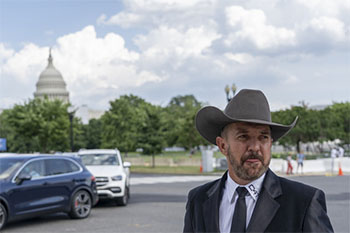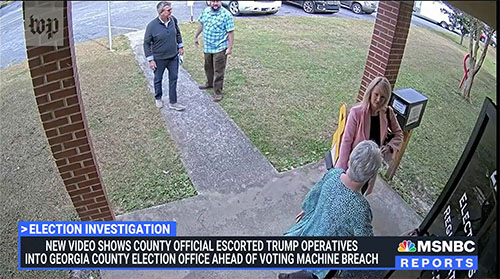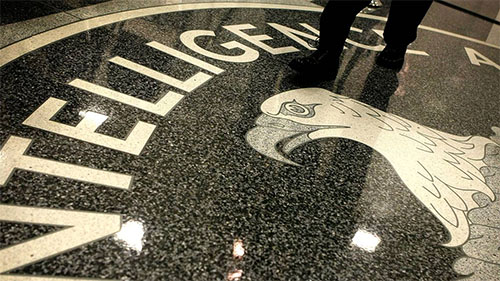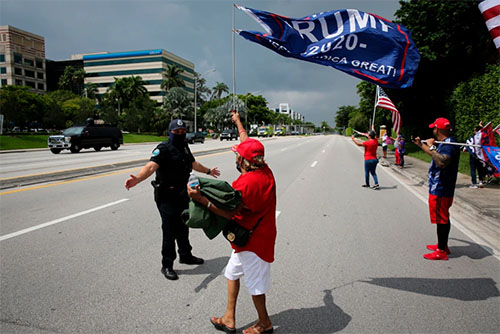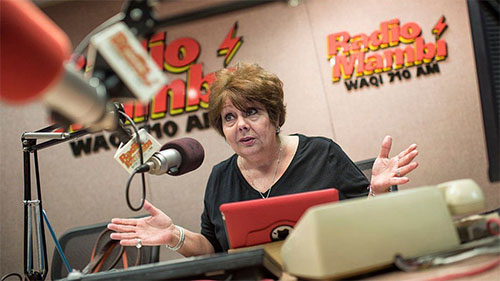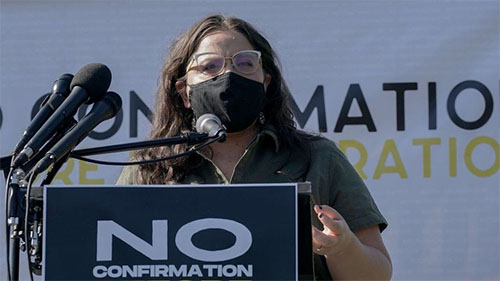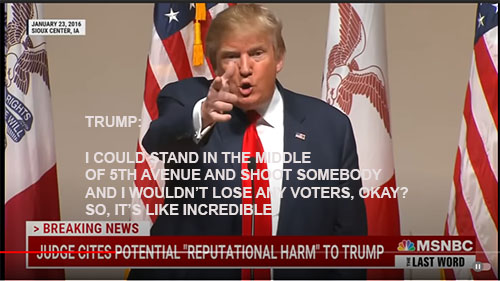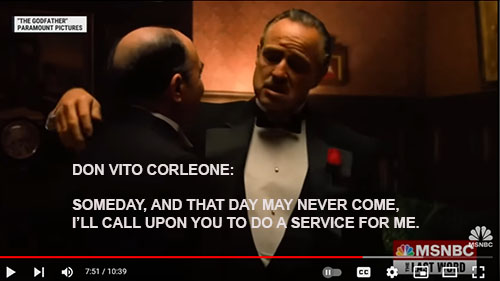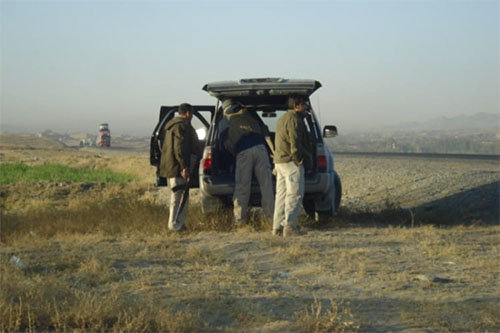Radio and Television Broadcasting to Cuba: Background and Issues Through 1994
by Congressional Research Service
August 30, 1994
https://crsreports.congress.gov
94-636
Mar-a-Lago Club, Address: 1100 S Ocean Blvd, Palm Beach, FL 33480
***
United States District Court, Southern District of Florida
Judge's Info
District Judges
This list is in Seniority Order
Chief Judge Cecilia M. Altonaga
Judge K. Michael Moore
Judge Donald M. Middlebrooks
Judge William P. Dimitrouleas
Judge Jose E. Martinez
Judge Marcia G. Cooke
Judge Kathleen M. Williams
Judge Robert N. Scola, Jr.
Judge Darrin P. Gayles
Judge Beth Bloom
Judge Robin L. Rosenberg
Judge Roy K. Altman
Judge Rodolfo A. Ruiz II
Judge Rodney Smith
Judge Raag Singhal
Judge Aileen M. Cannon
Senior Judge James Lawrence King
Senior Judge Jose A. Gonzalez, Jr.
Senior Judge William J. Zloch
Senior Judge Federico A. Moreno
Senior Judge Donald L. Graham
Senior Judge Daniel T. K. Hurley
Senior Judge Joan A. Lenard
Senior Judge Patricia A. Seitz
Senior Judge Paul C. Huck
Senior Judge Kenneth A. Marra
Senior Judge James I. Cohn
-- West Palm Beach, United States District Court, Southern District of Florida
Aileen Mercedes Cannon was born in 1981 in Cali, Colombia. Her mother had fled Cuba under Fidel Castro at the age of seven.
Cannon attended the University of Seville in Spain in 2001. She earned a Bachelor of Arts from Duke University in 2003, and a Juris Doctor, magna cum laude, from the University of Michigan Law School in 2007. She was inducted into the Order of the Coif and began her legal career as a law clerk to judge Steven Colloton of the United States Court of Appeals for the Eighth Circuit.
Cannon worked as an associate at Gibson, Dunn & Crutcher from 2009 to 2012. She served as an assistant United States Attorney for the Southern District of Florida beginning in 2013. Cannon has been a member of the Federalist Society since 2005.
On April 29, 2020, Trump announced his intent to nominate Cannon to serve as a United States district judge of the United States District Court for the Southern District of Florida.
-- Aileen [Mercedes] Cannon, by Wikipedia
12. Published Writings and Public Statements:...
Puede que el tomate reduzca tumors (English translation: Tomatoes May Help Reduce Tumors), El Nuevo Herald, Aug. 20, 2002, at C4. Copy supplied.
Un libro fecundo sobre la esterilidad (English translation: A Fertile Book about Infertility), EI Nuevo Herald, Aug. 17, 2002, at Cl. Copy supplied.
'Flamenco', una explosion de energia y pasion (English translation: Flamenco: An Explosion of Energy and Passion), EI Nuevo Herald, Aug. 16, 2002, at C3. Copy supplied.
Un mural en homenaje a la mujer Latina (English translation: A Mural in Homage of the Latin Woman), EI Nuevo Herald, Aug. 6,2002, at C2. Copy supplied.
Un mapa para ayudar a entender y seguir los instintos (English translation: A Map to Help Understand and Follow One's Instincts), EI Nuevo Herald, Aug. 6, 2002, at C3. Copy supplied.The new guide is part of the intelligence agency's Ask Molly series, an online CIA forum that answers questions from the public.
The agency also suggests planning detours on your travel excursions to avoid dangerous parts of the city and poorly lit neighborhoods at night.
And, above all, it suggests trusting your instincts.
-- Security locks, doorstops and bypasses: CIA shares how to travel like a spy, by Michael Wilner, El Nuevo Herald, 5/27/22
Yoga prenatal, una alternative saludable al parto (English translation: Prenatal Yoga: A Healthy Alternative for Delivery), EI Nuevo Herald, July 30, 2002, at C4. Copy supplied.
Marina Albornoz o la pasion por el color (English translation: Marina Albornoz or Passion for Color), EI Nuevo Herald, July 27,2002, at C2. Copy supplied.
Musica y arte este viernes en la Calle Ocho (English translation: Music and Art this Friday on Eighth Street), EI Nuevo Herald, July 26, 2002, at C3. Copy supplied.
La herencia musical de Puerto Rico (English translation: The Musical Heritage of Puerto Rico), EI Nuevo Herald, July 24, 2002, at C2. Copy supplied.
Precauciones a seguir con las comidas al aire libre (English translation: Precautions to Avoid Food-Borne Illness While Eating Outside), El Nuevo Herald, July 23, 2002, at C2. Copy supplied.
Amor por la radio desde muy joven (English translation: Love for the Radio Since a Young Age), EI Nuevo Herald, July 16, 2002, at C4. Copy supplied.
Camilo Mejia logra su sueno de ser astronaut por un fin de semana (English translation: Camilo Mejia Achieves his Dream to Become an Astronaut for a Weekend), EI Nuevo Herald, July 9, 2002, at C3. Copy supplied.
Interaccion para aprender buen espanol (English translation: Interaction to Learn Spanish Well), EI Nuevo Herald, July 2, 2002, at C2. Copy supplied.
De todo un poco este viernes en la Calle Ocho (English translation: A Little Bit of Everything this Friday on Eighth Street), EI Nuevo Herald, June 28, 2002, at C2. Copy supplied.
Summerbridge Miami, un puente hacia el futuro (English translation: Summerbridge Miami: A Bridge to the Future), EI Nuevo Herald, June 25, 2002, at C3. Copy supplied.
'The Atoms Family', una exhibicion sobre la energia (English translation: The Atoms Family: An Exhibition About Energy), EI Nuevo Herald, June 18, 2002, at C4. Copy supplied.
Ganadores en la competencia de 'Library Quest' (English translation: Winners in the Library Quest Competition), EI Nuevo Herald, June 18, 2002, at C3. Copy supplied.
-- UNITED STATES SENATE COMMITTEE ON THE JUDICIARY QUESTIONNAIRE FOR JUDICIAL NOMINEES, PUBLIC [AILEEN MERCEDES CANNON]
Yet perhaps the worst recent example of the U.S. governments meddling in news media anywhere involved Florida-based "reporters" who covered Cuba, U.S.-Cuban relations, and the Cuban American community. The story was first publicized in September 2006, when The Miami Herald reported that at least 10 South Florida journalists, including three staffers at the Herald's Spanish-language sister paper, El Nuevo Herald, had been moonlighting for Radio and TV Marti, the Miami-based government broadcaster that targets Cuba with U.S. propaganda.
-- Full disclosure: buying Venezuela's press with U.S. tax dollars, by Jeremy Bigwood, September-October 2010
Inflammatory broadcasts by RFE [Radio Free Europe] in the 1950s misled a small number of Hungarian people to rebel in 1956, believing the U.S. was ready to intervene on their behalf. The ensuing uproar forced RFE to modify its broadcasting methods, though its recent diatribes against Poland are reminiscent of the Hungarian fare -- but on a more sophisticated plane. Similarly, broadcast propaganda by the CIA's Radio Swan played a part in inducing the Bay of Pigs invaders of Cuba in 1961 to believe, quite incorrectly, that the Cuban population would support them. And, as the U.S. seldom learns from its mistakes, the energy the Reagan Administration has spent attempting to blackmail Congress into establishing Radio Marti against Cuba will surely backfire again.
In addition to its broadcasts, RFE/ RL openly operate the largest "private" research facility in the west which concentrates on information gathering -- or spying -- on Soviet and Eastern European nations, and on communist and socialist affairs.
But perhaps the most chilling "overt" propaganda project of the U.S. government to date is the newly unveiled Democracy Institute.
-- The CIA and the Media, by CovertAction Information Bulletin
In 1933, Joseph Goebbels, following closely the recommendations of Edward Bernays, nephew of Sigmund Freud, created some of the most effective propaganda the world has ever seen. Bernays’ prescription demanded the complete domination of communications media to stamp out any opposing view, the participation of artisans, celebrities, academic authorities and community leaders to influence popular opinion at a group level, and a Freudian appeal to base instincts – the need for food and shelter, community and leadership, and the influence of entertainment and fashion – to promote conformity among the German populace.
By now we are all familiar with the idea of German propaganda. In the West it is known by a more polite euphemism, public relations. PR is a lucrative business, with scores of non-government organisations competing for their share of generous funding. Once the province of legacy media such as Voice Of America, Radio Liberty, Radio Free Iraq, Radio Free Afghanistan, Radio Free Europe, Radio Free Asia, Worldnet Television and Radio/TV Marti, today it comprises think tanks, print media, arts and entertainment, the humanitarian-industrial complex, as well as new technology platforms such as Google, Facebook and Wikipedia, and a plethora of so-called independent media outlets and ‘fact checking’ sites and apps.
The emergence of strategic communications as a soft power option combines psychological operations, propaganda and public affairs under a single umbrella. The U.S. Agency for International Development (USAID), working in cooperation with George Soros’ [False Flag Factories] Open Societies, currently has a budget of US$40m to provide aid to so called ‘independent media organisations’ in 30 countries, including trouble spots such as Syria and Ukraine. The National Endowment for Democracy, set up by former CIA director William Casey under the Reagan Administration to help finance “perception management”, also receives tens of millions in federal funding, as do various “humanitarian NGOs” such as Amnesty International, Médecins Sans Frontières, and AVAAZ, who control Syria’s White Helmets.
-- Accusing your enemy of that which you are guilty – The CIA and the “fake news” conspiracy, by Sean Stinson
In the early 1980s, VOA began a $1.3 billion rebuilding program to improve broadcast with better technical capabilities. Also in the 1980s, VOA also added a television service, as well as special regional programs to Cuba, Radio Martí and TV Martí. Cuba has consistently attempted to jam such broadcasts and has vociferously protested U.S. broadcasts directed at Cuba.
-- Voice of America, by Wikipedia
Summary
Radio Marti first began broadcasting to Cuba in 1985 while TV Marti began broadcasting in 1990. Both programs are within the Office of Cuba Broadcasting, United States Information Agency (USIA). Almost since the beginning, U.S. government broadcasting to Cuba has been controversial. Supporters say a source of news independent of the Cuban government is important, especially in the post-Cold War climate. They say there is less print and broadcast media available now to Cubans than ever before. Critics of U.S. government broadcasting in Cuba say it has too much Cuban-American focus, and not enough diverse opinions. They claim that TV Marti broadcasts entertainment rather than news and editorials, and has low viewership because of jamming by the Cuban government and early morning time slots–3:30 am to 6:00 am. In addition, some lawmakers have expressed concern that the nine-person Advisory Board for Cuba Broadcasting, which is appointed by the President, with confirmation by the Senate, is not rotated as was stipulated by the legislation that created it. Thus, in recent years, the value of maintaining Cuba broadcasting as it currently exists has come into question.
In the Commerce, Justice, State Appropriations Act for FY1994 (P.L. 103-121), Congress provided funding for Radio and TV Marti, but withheld a portion for each until the USIA Director reported to Congress (not later than July 1, 1994) on the two programs. In issuing the report, the USIA Director was to take into account the findings and recommendations of the newly established Advisory Panel, which was created to study the “purpose, policies, and practices of radio and television broadcasting to Cuba.”
The Advisory Panel first met in December 1993 and submitted its two-volume report in March 1994. On July 8, 1994, USIA Director Joseph Duffey submitted to Congress his response to the Panel report. The Director made a determination that the best interests of the United States are being served by maintaining TV broadcasting to Cuba, that maintaining television broadcasting to Cuba is technically sound and effective, and that TV Marti broadcasting is consistently being received by a sufficient Cuban audience to warrant its continuation.
About the same time that the reports were submitted, the FY1995 budget funding process for Cuba Broadcasting was underway. The Administration requested $27.6 million for FY1995 appropriations for Cuba Broadcasting, an increase of 31.4 percent over the enacted FY1994 level. The House-passed bill recommended $8.6 million for Cuba Broadcasting, with no funding for TV Marti, while the Senate bill recommended $24.8 million for both Radio and TV Marti. In the end, the Senate version of the bill predominated when the issue was resolved in conference, and $24.8 million was appropriated for Cuba broadcasting. Debate on whether or how much to fund Cuban broadcasting is likely to continue into the future as long as the U.S. budget is constrained and the size of the Cuban viewing audience is in question.
Contents
• Introduction
• Establishment of Radio and TV Marti
• Cuba Broadcasting as Part of U.S. Government Broadcasting
• Congressional Concerns
o Politicization
o Broadcast Standards
o TV Marti’s Broadcasting Audience
• Congressional Funding
o FY1994 Funding and Conditions
o FY1995 Funding
• Advisory Panel Report and The USIA Director’s Response
o Advisory Board
o Broadcast Standards
o Professional Standards for the Office of Cuba Broadcasting
o Future of TV Marti
• Figures
• Figure 1. Components of U.S. Government
• Figure 2. Funds Available for U.S. Government International Radio and Television Broadcasting in 1993
• Tables
• Table 1. Advisory Board for Cuba Broadcasting: Current Membership, Term of Office, and Party Affiliation
• Table 2. History of Appropriations for Cuba Broadcasting
• Table 3. Annual Obligations for Radio and TV Marti*
• Appendixes
• Appendix. Advisory Panel
• Contacts
• Author Information
Introduction
Since their inception, Radio and TV Marti have attracted much controversy. In 1991, one of the findings of the U.S. Advisory Commission on Public Diplomacy was that TV Marti was not cost-effective when compared with other public diplomacy programs. In 1992, GAO questioned whether TV Marti met Voice of America broadcast standards, as required by law.1 In 1992 and 1993, news articles criticized the effectiveness of TV Marti in reaching the Cuban audience.2 In 1993, some Members of Congress debated the value of continuing funding it. Subsequently, the Commerce, Justice, State and Related Agencies Appropriation Act for FY1994 (P.L. 103-121) established an Advisory Panel on Radio and TV Marti to determine whether the broadcasting of these entities: (1) consistently meets standards for quality and objectivity established by law or by USIA, (2) is cost effective, (3) is being received by the Cuban people on a daily basis, (4) and if TV Marti is technically sound and effective and is consistently being received by a sufficient Cuban audience to warrant its continuation. Furthermore, the Act stipulated that appropriations would be withheld until 30 days after the Director makes reports after consulting with the Advisory Panel on measures that the USIA is taking with respect to recommendations of the Panel.
On December 21, 1993, the Director of the USIA, Joseph Duffey, announced the formation of the three-member Panel. The Panel met for the first time on December 28, 1993 and terminated in March 1994, as soon as the report was submitted to Congress. Generally, the Advisory Panel concluded that both Radio and TV Marti should be continued and streamlined. As required by the FY1994 appropriations law, USIA Director Joseph Duffey submitted a response to the findings of the Advisory Panel in July 1994, as well as his determination that TV Marti is technically sound and effective, is consistently being received by a sufficient Cuban audience, and is in the best interest of the United States to maintain.
At about the same time, Congress was considering the President’s $27.6 million budget request for Cuba Broadcasting for FY1995. The House approved $8.625 million, about $19 million below the request and $12.4 million less than current funding of $21 million; the House recommended no funding for TV Marti. The Senate, however, set funding closer to the Administration request– at $24.8 million for both Radio and TV Marti. In the end, the Senate version of the bill predominated and $24.8 million was appropriated for Cuba broadcasting (P.L. 103-317).
This report provides a legislative history and funding levels for Cuba Broadcasting. It discusses specific concerns some lawmakers have had with Radio and TV Marti over the years, and presents the Panel’s recommendations and the USIA Director’s response and determinations, as required by the FY1994 appropriations act.
Establishment of Radio and TV Marti
Since the early 1960s, U.S. policy toward Cuba has consisted largely of isolating the island nation through a comprehensive trade embargo.3 When Fidel Castro came to power in 1959 and began to build a Communist dictatorship, U.S.–Cuban relations deteriorated sharply. The Kennedy Administration broke U.S. diplomatic relations with Cuba in 1961 after Cuba demanded that U.S. Embassy staff be reduced to a skeleton crew. The United States subsequently sponsored the ill-fated Bay of Pigs invasion by anti-Castro Cubans in 1961, and in 1962 imposed a comprehensive trade embargo on Cuba because of Castro’s expropriation, without compensation, of U.S. properties in Cuba. Tensions peaked in October 1962 during the Cuban missile crisis when the Soviet Union attempted to install offensive missile sites in Cuba.
In the early to mid-1970s, there was some movement toward normalization of relations, but in the late 1970s, Cuba’s military involvement in Africa and its support for revolutionary groups in the Caribbean Basin region halted any movement toward improved relations. In the 1980s, U.S.-Cuban relations remained tense because of Cuba’s support for revolutionary movements abroad.
It was in this environment that in late September 1983, Congress approved specialized U.S. Voice of America (VOA) programming for Cuba with passage of the Radio Broadcasting to Cuba Act (P.L. 98-111).4 According to the legislation, while the VOA was already broadcasting to Cuba, “there is a need for broadcasts to Cuba which provide news, commentary and other information about the events in Cuba and elsewhere to promote the cause of freedom in Cuba.” As a result of the legislation, Radio Marti – named for 19th century Cuban nationalist hero Jose Marti – began broadcasting to Cuba on May 20, 1985.
In 1987, just two years after Radio Marti’s first broadcast, Congress approved funding for a study on the feasibility of establishing a U.S. government television service to Cuba in order to increase the free flow of information into that country. Congress then authorized and provided money for startup operations and testing of television broadcasting to Cuba in 1988 in the FY1989 State Department appropriations measure (P.L. 100-459, H.R. 4782). In 1990, Congress authorized the establishment of TV Marti when it approved the Television Broadcasting to Cuba Act as part of the State Department authorization measure for FY1990 and FY1991 (P.L. 101-246, H.R. 3793). Television broadcasting to Cuba began in March 1990 on an experimental basis and then began regular operations in August 1990. The broadcasts originate in Washington and are transmitted to Cudjoe Key, Florida, by satellite. The broadcasts are then beamed to Cuba after being uplinked to a transmitter in an aerostat.
In order for the FY1990-FY1991 funding of TV Marti to go forward, the legislation called for the President to determine that the testing of TV Marti demonstrated television broadcasting to Cuba was feasible and would not cause objectionable interference with the broadcasts of Cuban licenses. President Bush made the required determination in August 1990 (Presidential Determination No. 90-35) which allowed TV Marti to continue beyond its testing phase.
Under the legislation authorizing Radio Marti, a nine-member Advisory Board for Cuba Broadcasting (originally called the Board for Radio Broadcasting) was created. It has the task of reviewing the effectiveness of Radio and TV Marti and making any recommendations it may consider necessary. The Board’s members are appointed by the President, by and with the advice and consent of the Senate, with not more than five members of the same political party and with the President designating one member of the Board to serve as chairperson. The Act stipulated that the initial Board members were to stagger rotation off the Board in one, two or three years, as designated. Thereafter, Board member terms would be three years. The legislation also states that any board member whose term has expired may serve until the President appoints a successor.
Cuba Broadcasting as Part of U.S. Government Broadcasting
Currently, the United States government supports general broadcasting, such as Voice of America (VOA), and surrogate broadcasting, such as Cuba Broadcasting (Radio and TV Marti) and Radio Free Europe/Radio Liberty (RFE/RL).5 RFE/RL is independent of a U.S. government agency,6 while Cuba Broadcasting has always been within USIA’s Bureau of Broadcasting. Figure 1 shows how Radio and TV Marti, under the Office of Cuba Broadcasting, organizationally fit into the larger picture of U.S. government international broadcasting. (For more information on U.S. government international broadcasting, see CRS Report 94-29, International Broadcasting: Consolidation of U.S. Radio Services.)
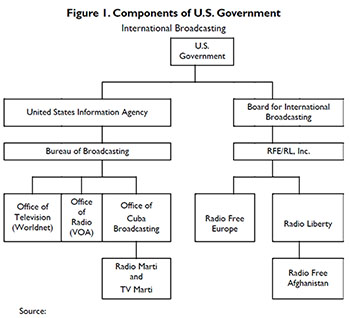
Figure 1. Components of U.S. Government, International Broadcasting
U.S. Government
United States Information Agency
Board for International Broadcasting
Bureau of Broadcasting
RFE/RL, Inc.
Office of Television (Worldnet)
Office of Radio (VOA)
Office of
Cuba Broadcasting
Radio Free Europe
Radio Liberty
Radio Marti and
TV Marti
Radio Free Afghanistan
Source:
Congressional Concerns
Over the years, members of Congress have debated the merits of the United States broadcasting to Cuba. Congressional concerns about Radio and TV Marti have included the following: politicization of the Advisory Board for Cuba Broadcasting; meeting VOA broadcast standards; and audience size and accessibility of TV Marti broadcasts to Cubans.
Politicization
Concerns about politicization at Radio and TV Marti have centered around the role of the Advisory Board for Cuba Broadcasting and its controversial chairman, Jorge Mas Canosa. Many are concerned about the lack of turnover of the Board members and the chairman, as was intended by the originating legislation. As illustrated in Table 1, the terms of all Board members, including the chairman, will have expired by the end of October 1994. Some critics claim that the lack of turnover is due to a lack of willingness on the part of past and current Administrations to change the composition of the Board. They say that the conservative Mas Canosa has attempted to use his influence to gain control of the radio station so that it could be used to propagate the views of the Cuban American National Foundation, a Cuban exile organization founded by Mas Canosa in 1981. Some have argued further that Mas Canosa is using his position to promote himself as the next Cuban leader after Castro.
Former Radio Marti Director Ernesto Betancourt maintains that he was ousted from his position in 1990 because of his alleged opposition to TV Marti and because Mas Canosa claimed to have lost control of Radio Marti.7 In a 1994 statement, Betancourt stated that his ouster “opened the floodgates for the politicization of the station, dragging it into exile politics and seriously weakening its editorial integrity.”8
Mas Canosa maintains that he has never tried to use Radio Marti for personal or foundation propaganda.9 At the time, a USIA spokesman stated that Betancourt was being reassigned to fill a critical need for the position of director of a USIA research office, a position which Betancourt declined.10
Betancourt urges abolishing the Advisory Board contending that it has “lost the trust of Congress,” has been “caught in a conflict of interest and has become part of the problem and not of the solution.” Betancourt asserts that “these stations should not be platforms for a political afterlife in post-Castro Cuba.” If the Advisory Board were not abolished, he recommends that it should at least be renewed with a broader representation, “including members of, but not dominated by, the Cuban-American community,” with “no figure politically active among exile groups.”11
Another concern expressed by some observers is for the Board’s membership to be more balanced, with a broad gamut of Cuban American viewpoints represented. The current membership of the Advisory Board consists of five Republicans, three Democrats and one Independent. It has been chaired by Mas Canosa since its establishment. Many seem to concur that more diverse views are needed. Some believe that Mas Canosa should rotate off the Board entirely; some believe he should resign the chairmanship of the Advisory Board, but still remain as a Board member because of his experience.12
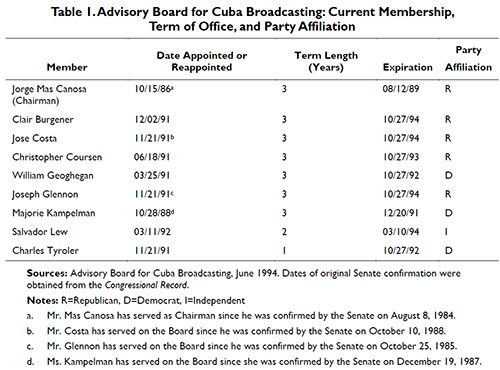
Table 1. Advisory Board for Cuba Broadcasting: Current Membership, Term of Office, and Party Affiliation
Member / Date Appointed or Reappointed / Term Length (Years) / Expiration / Party Affiliation
Jorge Mas Canosa (Chairman) / 10/15/86a / 3 / 08/12/89 / R
Clair Burgener / 12/02/91 / 3 / 10/27/94 / R
Jose Costa / 11/21/91b / 3 / 10/27/94 / R
Christopher Coursen / 06/18/91 / 3 / 10/27/93 / R
William Geoghegan / 03/25/91 / 3 / 10/27/92 / D
Joseph Glennon / 11/21/91c / 3 / 10/27/94 / R
Majorie Kampelman / 10/28/88d / 3 / 12/20/91 / D
Salvador Lew / 03/11/92 / 2 / 03/10/94 / I
Charles Tyroler / 11/21/91 / 1 / 10/27/92 / D
Sources: Advisory Board for Cuba Broadcasting, June 1994. Dates of original Senate confirmation were obtained from the Congressional Record.
Notes: R=Republican, D=Democrat, I=Independent
a. Mr. Mas Canosa has served as Chairman since he was confirmed by the Senate on August 8, 1984.
b. Mr. Costa has served on the Board since he was confirmed by the Senate on October 10, 1988.
c. Mr. Glennon has served on the Board since he was confirmed by the Senate on October 25, 1985.
d. Ms. Kampelman has served on the Board since she was confirmed by the Senate on December 19, 1987.
Broadcast Standards
Closely related to the question of politicization of Cuba Broadcasting is the issue of broadcasting standards of Radio and TV Marti. Some of the concerns that have been raised by observers and by some Members of Congress include: broadcasting too much Cuban-American news, too much entertainment and not enough news, a lack of editorials offering a wide variety of views, and a lack of on-air corrections of broadcasting errors.
In May 1992, the U.S. General Accounting Office (GAO) issued a report on TV Marti’s compliance with broadcast standards.13 As part of the study, the GAO employed three consultants to watch broadcasts and assess program quality and compliance with Voice of America standards that broadcasts be objective, accurate, balanced, and present a variety of views. According to the report, two of the three consultants “believed that the broadcasts related to Cuba and the Cuban-American community lacked balance and did not meet established Voice of America standards.
The other consultant believed that the broadcasts generally met the standards but that improvements were needed.” In addition, the report noted that “TV Marti’s in-house critics also observed that some broadcasts might not meet standards.” GAO recommended that the USIA Director instruct VOA to institute procedures to ensure that TV Marti’s broadcasts meet established VOA standards. With regard to Radio Marti, in October 1992, GAO staff met with officials of USIA’s Bureau of Broadcasting about allegations that Radio Marti broadcasts did not meet VOA standards and suggested that the Bureau consider establishing an external review committee. In order to implement the GAO recommendations, the Office of Cuba Broadcasting established External Review Panels to review Radio and TV Marti’s news and programming. Concern has surfaced, however, regarding the objectivity of the External Review Panels, since they are selected by the Office of Cuba Broadcasting.
A long-time Radio Marti staff member, J. Richard Planas, recently stated “that there is significant politicization of news and information within Radio Marti to the extent that we may need to consider if Radio Marti is doing both the Cuban people and U.S. foreign policy a disservice.” According to Planas, Radio Marti editorial “guidelines are routinely ignored in deliberate attempts to favor a specific political agenda.” The agenda consists of: stressing commentaries that are critical and derisive of the Cuban regime, while downplaying favorable evaluations and statements of support toward Cuba; stressing the “hard line” policy toward Cuba while downplaying criticism of the U.S. embargo or views favoring negotiations with Castro; presenting favorable aspects of Cuban American political leaders who support the “hard line” policy while downplaying or even censoring criticism of these leaders; emphasizing the deficiencies of the Cuban regime while de-emphasizing its accomplishments; and favoring broadcasts of opinions and views about, or calls for, the imminent fall of the Cuban regime. 14
Former Director of the Office of Cuba Broadcasting, Antonio Navarro, maintains that over the past three years “Radio Marti has drastically increased the volume of news and information as well as the diversity of responsible opinions in its programming” and that “no one person, organization or viewpoint dominates or controls any aspect of Radio or TV Marti.”15
In early June, because of the numerous allegations regarding the management of the Office of Cuba Broadcasting, Representative John Conyers, Chairman of the House Government Operations Committee’s Legislation and National Security Subcommittee, wrote to USIA Director Duffey. Representative Conyers expressed concerns about: alleged political bias which is reportedly undermining the accuracy and objectivity of broadcasts to Cuba; alleged retaliation against employees in the Office of Cuba Broadcasting who have criticized this political bias; and alleged cronyism whereby new employees have been hired not for their expertise, but because of their connections to influential individuals.16 Depending on Director Duffey’s response to Representatives Conyers letter (which was requested by June 20, 1994, but reportedly has not yet been received), the Subcommittee may hold hearings to investigate the allegations.17
TV Marti’s Broadcasting Audience
Another fundamental concern for many observers, including Members of Congress, is whether TV Marti is actually being viewed in Cuba. Two reasons for low viewership are (1) the ratification by both the United States and Cuba of the International Telecommunications Convention which requires that TV stations be established so as not to interfere with other nations’ broadcasts. To comply with this treaty, U.S. broadcasts in Cuba must be scheduled from 3:30 a.m. to 6:00 a.m.; and (2) the constant and effective jamming of the broadcasts by the Cuban government.
A 1991 report issued by the President’s Task Force on U.S. government International Broadcasting noted that TV Marti is impeded “because it is forced to broadcast during a time period when there are few viewers.” The Task Force report recommended that “the U.S. government should view this as a matter of high priority and should act with vigor to try to gain better broadcast hours,” but also asserted that “if it is not possible to change and extend the hours of broadcasting to reach a larger audience, the service should be terminated.”18 In March 1994, the Chairman of the Task Force, John Hughes, stated that the Task Force probably had the same views as in the 1991 report, and characterized the 1991 report as concluding “that it was pointless and wasteful to continue TV Marti’s operations, unless the viewing audience in Cuba could be substantially expanded.”19
In large part because of the viewership problems, the U.S. Advisory Commission on Public Diplomacy20 stated in a 1991 report “that TV Marti is not cost-effective at the present time when compared with other public diplomacy programs of proven value.”21 In 1993, the Commission reiterated its statement that TV Marti was not cost effective, and recommended that “it should be shut down and its resources directed to productive public diplomacy activities.” The report noted that despite sizeable funding, “consistent and effective Cuban jamming has resulted in only trace audiences for TV Marti’s programs.”22
Congressional Funding
Every two years, Congress authorizes appropriations for State Department, USIA and broadcasting entities, including the Office of Cuba Broadcasting within the USIA as part of the Foreign Relations Authorizations Act. Annually, Congress passes appropriations for USIA within the Commerce, Justice, State and Related Appropriations Act. Figure 2 illustrates the funding level of Radio and TV Marti compared to funding for other U.S. government-funded international broadcasts.
Because of congressional concerns about Cuba Broadcasting, there have been attempts by some Members to cut back or curtail funding for either one or both broadcasting operations. Nevertheless, until FY1994 both programs have been funded at levels similar to those requested by the Administration. Table 2 shows the historical record of congressional appropriations for Cuba Broadcasting, including the number of positions funded. Table 3 shows the actual Radio and TV Marti expenditures.
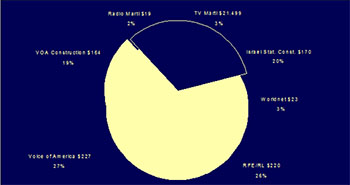
Figure 2. Funds Available for U.S. Government International Radio and Television Funds Broadcasting in 1993
(in millions) *
Source: U.S. Advisory Commission on Public Diplomacy 1993 Annual Report, p. 43.
Note: * Funds for U.S. government international broadcasting in FY1993 total $844 million. Amounts reflect FY1993 appropriations plus carryover balances. The ratio of radio to television is $800 million to $44 million – or 18 to 1.
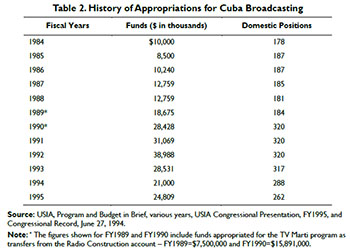
Table 2. History of Appropriations for Cuba Broadcasting
Fiscal Years / Funds ($ in thousands) / Domestic Positions
1984 / $10,000 / 178
1985 / 8,500 / 187
1986 / 10,240 / 187
1987 / 12,759 / 185
1988 / 12,759 / 181
1989* / 18,675 / 184
1990* / 28,428 / 320
1991 / 31,069 / 320
1992 / 38,988 / 320
1993 / 28,531 / 317
1994 / 21,000 / 288
1995 / 24,809 / 262
Source: USIA, Program and Budget in Brief, various years, USIA Congressional Presentation, FY1995, and Congressional Record, June 27, 1994.
Note: * The figures shown for FY1989 and FY1990 include funds appropriated for the TV Marti program as transfers from the Radio Construction account – FY1989=$7,500,000 and FY1990=$15,891,000.
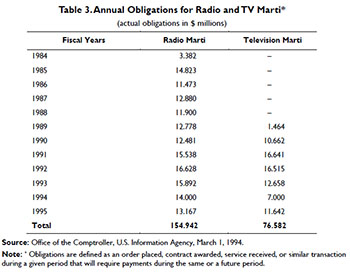
Table 3. Annual Obligations for Radio and TV Marti*
(actual obligations in $ millions)
Fiscal Years / Radio Marti / Television Marti
1984 / 3.382 / –
1985 / 14.823 / –
1986 / 11.473 / –
1987 / 12.880 / –
1988 / 11.900 / –
1989 / 12.778 / 1.464
1990 / 12.481 / 10.662
1991 / 15.538 / 16.641
1992 / 16.628 / 16.515
1993 / 15.892 / 12.658
1994 / 14.000 / 7.000
1995 / 13.167 / 11.642
Total / 154.942 / 76.582
Source: Office of the Comptroller, U.S. Information Agency, March 1, 1994.
Note: * Obligations are defined as an order placed, contract awarded, service received, or similar transaction during a given period that will require payments during the same or a future period.

